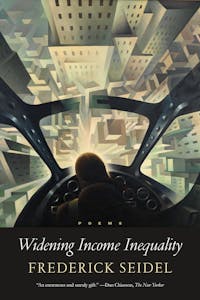Widening Income Inequality
Poems
 Download image
Download image
ISBN10: 0374536848
ISBN13: 9780374536848
Trade Paperback
128 Pages
$17.00
CA$23.00
Frederick Seidel has been called many things. A "transgressive adventurer," "a demonic gentleman," "a "triumphant outsider," "a great poet of innocence," and "an example of the dangerous Male of the Species," just to name a few. Whatever you choose to call him, one thing is certain, "he radiates heat" (The New Yorker).
Now add to that: the poet of aging and decrepitude.
Widening Income Inequality, Seidel's new poetry collection, is a rhymed magnificence of sexual, historical and cultural exuberance, a sweet and bitter fever of Robespierre and Obamacare and Apollinaire, of John F. Kennedy and jihadi terror and New York City and Italian motorcycles. Rarely has poetry been this true, this dapper, or this dire. Frederick Seidel is "the most poetic of the poets and their leader into hell."
Reviews
Praise for Widening Income Inequality
"Seidel’s satanic refinement is expressed in poems at once suave and vengeful, their garish pleasures linked to the many splendid goods—Ducati motorcycles, bespoke suits, Italian shoes—that they describe. To encounter a poem by Seidel is therefore to be co-opted into his Ricardo Montalban aesthetic of creepy luxury. American poets like to think of their art as open, democratic, all-embracing; few aside from Seidel have imagined the lyric poem to be an exclusive haunt of self-flattering, hedonistic élites . . . Encroaching death gives some of Seidel’s blasphemy a kind of ballsy élan, as he puts his mortal money where his outrageous mouth has always been. The horror in these poems seems real, not hyped. And Seidel’s nastiness seems, in this work, a necessary defense against fear, rather than a shock tactic that has escalated as his readers’ interest has dwindled. It is better to be lonely than to die: this is the bracing news these poems deliver."—Dan Chiasson, The New Yorker
"Who is Frederick Seidel? What is the I’m that he rhymes? These are the questions demanded of (and by) his new readers. Among the known-knowns: he is a human vibrator, the 'laureate of the louche,' a poet about town in New York City, a coal heir from St. Louis, a former Harvard graduate who once visited with Pound and Eliot, a rider of Ducati motorcycles—I’m just listing, off the cuff, common notes from Seidel’s mythology, items you can find in any review or profile or interview. Still, knowing these things doesn’t bring you nearer to a revelation—that he is one of the greatest lyrical performers of selfhood in English-language literature—that can only be had while reading his poetry over time. If you begin at the beginning (or the end) and work your way forward (or backward), it becomes clear that Seidel is also the principal destroyer of confessional poetry, or at least its synthesizer. And if his self is performed so consistently and to such great effect, it may be because he has scattered it in a dark cloud of symbols: the assassination of Robert Kennedy, the Shah of Iran, more Wordsworth than people think, the White House, Broadway. It’s as if he can’t dissolve so long as these cross-alluding names and things live on the page. In the new book, his best since the evil Ooga-Booga, Seidel is yet new versions of the same self, which is to say that he is still a 'marvelously elegant ghoul,' or the 'most poetic of poets and their leader into hell.' Here Seidel could be shepherding all of the poets too evil for the Republic, or ordinary terrorists, or just his other incarnations—into oblivion. The last of these seems to me most likely: he is, in Widening Income Inequality, both Dante and Virgil, winding himself down the path to old age and death. After all, he turns eighty this month, and he has never shied away from his hatred of death and illness. All the same, this is probably the most fragile Fred we’ve ever read."—Jonathon Sturgeon, Flavorwire



